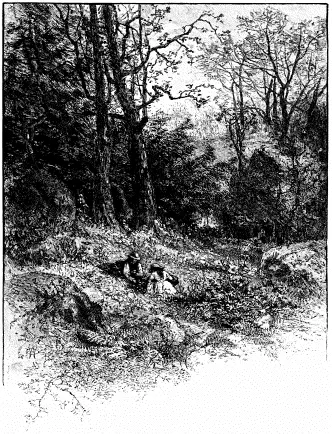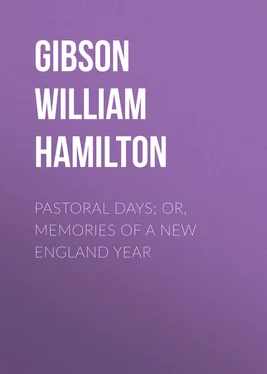William Gibson - Pastoral Days; or, Memories of a New England Year
Здесь есть возможность читать онлайн «William Gibson - Pastoral Days; or, Memories of a New England Year» — ознакомительный отрывок электронной книги совершенно бесплатно, а после прочтения отрывка купить полную версию. В некоторых случаях можно слушать аудио, скачать через торрент в формате fb2 и присутствует краткое содержание. Жанр: История, foreign_antique, foreign_prose, на английском языке. Описание произведения, (предисловие) а так же отзывы посетителей доступны на портале библиотеки ЛибКат.
- Название:Pastoral Days; or, Memories of a New England Year
- Автор:
- Жанр:
- Год:неизвестен
- ISBN:нет данных
- Рейтинг книги:5 / 5. Голосов: 1
-
Избранное:Добавить в избранное
- Отзывы:
-
Ваша оценка:
- 100
- 1
- 2
- 3
- 4
- 5
Pastoral Days; or, Memories of a New England Year: краткое содержание, описание и аннотация
Предлагаем к чтению аннотацию, описание, краткое содержание или предисловие (зависит от того, что написал сам автор книги «Pastoral Days; or, Memories of a New England Year»). Если вы не нашли необходимую информацию о книге — напишите в комментариях, мы постараемся отыскать её.
Pastoral Days; or, Memories of a New England Year — читать онлайн ознакомительный отрывок
Ниже представлен текст книги, разбитый по страницам. Система сохранения места последней прочитанной страницы, позволяет с удобством читать онлайн бесплатно книгу «Pastoral Days; or, Memories of a New England Year», без необходимости каждый раз заново искать на чём Вы остановились. Поставьте закладку, и сможете в любой момент перейти на страницу, на которой закончили чтение.
Интервал:
Закладка:
A HANDFUL FROM THE WOODS.
Down in the moist green swamp lot the yellow cowslips bloom along the shallow ditch, and the eager farmer’s wife fills her basket with the succulent leaves she has been watching for so long; for they’ll tell you in New England that “they ain’t noth’n’ like caowslips for a mess o’ greens.” Near by we see the frog pond, with lush growth of arrow leaves and pickerel weed, and flat blades of blue-flag just starting from the boggy earth. Half submerged upon a lily pad, close by the water’s edge, an ugly toad sits watching for some winged morsel for that ample mouth of his.
Who could believe that so much poetic inspiration could emerge from such a mouth as that; for verily it is this miserable-looking toad that lifts his little voice in the dreamy, drowsy chorus of the twilight. All sorts of odium have been heaped upon the innocent toad; but he only returns good for evil. He is the farmer’s faithful friend. He guards his garden by day, and lulls him to sleep by night. Yonder, near those withered cat-tails, we see the village boys among the calamus-beds, pulling up the long white roots tipped with pink and fringed with trickling rootlets. What visions of candied flag-root stimulate them in their zeal! I can almost see the tender, juicy leaf-bud screened beneath that smooth pink sheath, and its aromatic pungency is as fresh and real to me as this appetizing fragrance that comes to us from the green tufts of spearmint we crush beneath our feet at every step. Bevies of swallows all around us skim through the air, like feathered darts, in their twittering flight; and the restless starling, like a field-marshal, with his scarlet epaulets, keeps sharp lookout for the enemy, and “flutes his O-ka-lee” from the high alder-bush at the slightest approach upon his chosen ground. Yonder on the wooded slope the feathery shad-tree blooms, like a suspended cloud of drifting snow lingering among the gray twigs and branches; and chasing across the matted leaves beneath, a lively troop of youngsters, girls and boys, make the woods resound with their boisterous jubilee. A jolly band of fugitives fresh from the stormy week’s captivity – spring buds bursting with life, with a pent-up store of spirits that finds escape in an effervescence of ringing laughs and in a din of incessant jabber. Well I know the buoyant exhilaration that impels them on in their reckless frolic, as they skip from stone to stone across the rippling stream, or “stump” each other on the treacherous crossing-pole which spans the deep still current! Now I see them huddle around the trickling grotto among the mossy bowlders in the steep gully yonder, where the mountain spring bubbles into a crystal pool. Alas! how quickly its faint blue border of hepaticas is rifled by the ruthless mob! Now they clamber up the great gray rocks beneath the drooping hemlocks, stopping in their headlong zeal to snatch some trembling cluster of anemone, nodding from its velvety bed of moss; now plunging down on hands and knees, shedding innocent blood among an unsuspecting colony of fragile bloom – those glowing blossoms so welcome in the early spring! Who does not know the bloodroot – that shy recluse hiding away among the mountain nooks, that emblem of chaste purity with its bridal ring of purest gold? Who has not seen its tender leaf-wrapped buds lifting the matted leaves, and spreading their galaxy of snowy stars along the woodland path?
Then there was the shy arbutus, too. Where in all the world’s bouquet is there another such a darling of a flower? And where in all New England does that darling show so full and sweet a face as in its home upon that sunny slope I have in mind, and know so well? Was ever such a fragrant tufted carpet spread beneath a hesitating foot? Even now, along the lichen-dappled wall upon the summit, I see the lingering strip of snow, gritty and speckled, and at its very edge, hiding beneath the covering leaves, those modest little faces looking out at me – faces which seemed to blush a deeper pink at their rude discovery. No other flower can breathe the perfume of the arbutus, that earthy, spicy fragrance, which seems as though distilled from the very leaf-mould at its roots. Often on this sunny slope, so sheltered by dense pines and hemlocks, have these charming clusters, pink and white, burst into bloom beneath the snow in March; and even on a certain late February day, we discovered a little, solitary clump, fully spread, and fairly ruddy with the cold. Here, too, we found the earliest sprays of the slender maidenhair; that fairy frond and loveliest among ferns, with black and lustrous stems, and graceful spread of tender gauzy green.
AFTER ARBUTUS.
Where was the nook in all that hill-side woods that we left unsearched in our April ramblings? I recall the “tat,” “tat” upon the dry carpet of beech leaves, as the delicate anemone in my hand is dashed by a falling drop! Lost in eager occupation, we had not observed the shadow that had stolen through the forest; and now, as we look out through the trees, we see the steel-blue warning of the coming shower, and feel the first gust of the tell-tale breeze – how the willows wave and gleam against the deep gray clouds, so weirdly reflected in the gliding stream beneath, like an open seam to another sky! See the silvery flashes of that flock of pigeons circling against the lurid background. No, we cannot stop to see them, for the rain-drops begin to patter thick and fast. Away we scamper to the shelter of the overhanging rocks. The lowering sky rolls above us through the branches. The glassy surface of the brook takes on a leaden hue as the rain-cloud drags its misty veil across the distant meadows. The brown leaves jump and spatter at my feet, and the blue liverwort flowers on right and left duck their heads like little living things dodging the pelting rain-drops.
THE FAIRY FROND.
Oh, the lovely fickleness an April day! Even now the distant hill is lit up by the bursting sun. Nearer and nearer the gleam creeps across the landscape, chasing the shower away, and in a moment more the meadows glow with a freshened green, and the trees stand transfigured in glistening beads flashing in the sunbeams. The quickened earth gives forth its grateful incense, and even an enthusiastic frog down in the lily-pond sends up his little vote of thanks.
AN APRIL DAY.
April’s woods are teeming with all forms of life, if one will only look for them. On every side the ferns, curled up all winter in their dormant sleep, unroll their spiral sprays, and reach out for the welcome sun. The spicy colt’s-foot, or wild ginger, lifts its downy leaves among the mossy rocks and crevices, and its homely flower just peeps above the ground, and, with a lingering glance at the blushing Rue anemone close by, hangs its humble head, never to look up again. High above us the eccentric cottonwood-tree dangles its long speckled plumes, so silvery white. Now we hear a mellow drumming sound, as some unsuspecting grouse, concealed among the undergrowth near by, beats his resonant breast. Could we but get a glimpse of him, we would see him simulate the barn-yard gobbler, as with proud strut and spreading tail he disports himself upon some fallen log or mossy rock. Perhaps, too, that coy mate is near, admiring his show of gallantry, and holding a sly flirtation.

AMONG THE WILD FLOWERS.
THE COLUMBINE.
The grotesque Jack-in-the-pulpit, rising above that crumbling log, is named more to my mind. There he stands beneath his striped canopy, and preaches to me a sermon on the well-remembered rashness of my youth in trifling with that subterranean bulb from which he grows. But I ignored his warning in those early days. I only knew that a real nice boy across the way seemed very fond of those little Indian turnips, called them “sugar-roots,” and said that they were full of honey. And as he bit off his eager mouthful, and refused to let me taste, I sought one for myself, and, generous boy that he was, he showed me where to find the buried treasure. It was like a small turnip, an innocent-looking affair (and so was the nice boy’s modelled piece of apple, by-the-way). But oh! the sudden revelation of the red-hot reservoir of chain-lightning that crammed that innocent bulb! Even as I think of it, how I long once more to interview that real nice boy who opened up the mysteries of the “sugar-root” to my tempted curiosity. Let boys beware of this wild, red-hot coal; and should they be impelled by a desire to test the unknown flavor, let them solace themselves with a less dangerous mixture of four papers of cambric needles and a spoonful of pounded glass. This will give a faint suggestion of the racy pungency of the Indian turnip. Were some kind friend at the present day to seek to kill me off with poisoned food, I should forthwith have him arrested on a charge of attempted murder, and incarcerated in the county jail. But what would be wilful homicide in the man is only a guileless proof of friendship in the boy, and his affections and their symptoms present a living paradox; and those boisterous days, with all their fond caresses in the way of fights and bruises and black eyes, and even Indian turnips, we all agree were full of fun the like of which we never shall see again.
Читать дальшеИнтервал:
Закладка:
Похожие книги на «Pastoral Days; or, Memories of a New England Year»
Представляем Вашему вниманию похожие книги на «Pastoral Days; or, Memories of a New England Year» списком для выбора. Мы отобрали схожую по названию и смыслу литературу в надежде предоставить читателям больше вариантов отыскать новые, интересные, ещё непрочитанные произведения.
Обсуждение, отзывы о книге «Pastoral Days; or, Memories of a New England Year» и просто собственные мнения читателей. Оставьте ваши комментарии, напишите, что Вы думаете о произведении, его смысле или главных героях. Укажите что конкретно понравилось, а что нет, и почему Вы так считаете.










